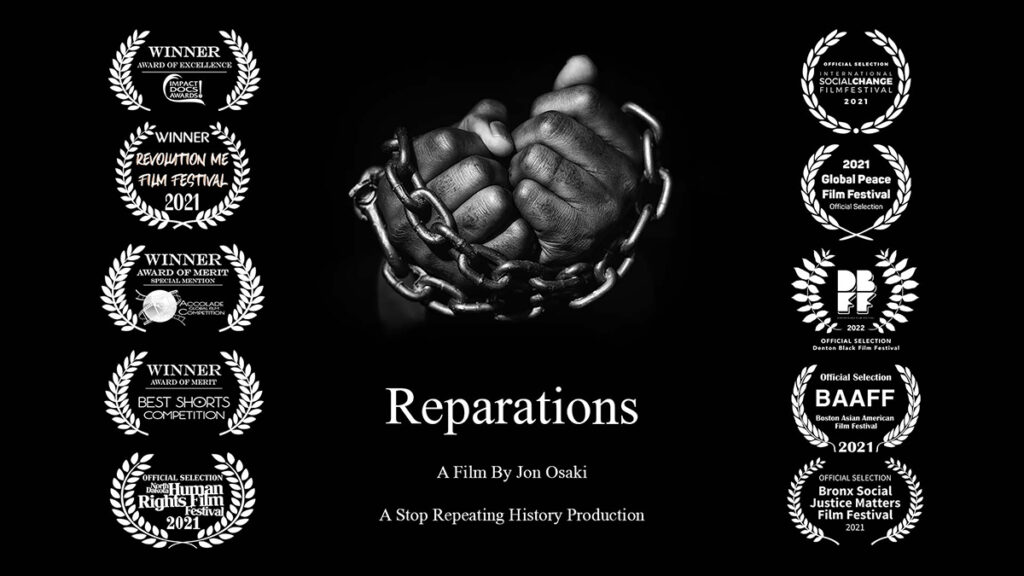By Andrew Hamlin
NORTHWEST ASIAN WEEKLY
Filmmakers generally start with a sense of who inspires them filmwise. Certain directors, actors, producers, and/or screenwriters fire their fancy.
In the case of activist filmmaker Jon Osaki, inspiration came through other means.
“I never thought about making movies growing up,” remembered Osaki, whose documentary film “Reparations: Building Solidarity & Community,” on the Black reparations movement, showed on Oct. 30 at Seattle Central College.
“The whole idea seemed way too large and unattainable. However, when I was very young, my oldest brother created a slideshow that was synced to music, and I thought it was one of the coolest things I had ever seen. Seeing a story told with images in combination with perfectly-paired music was extremely intriguing.”
Asked about professional filmmakers that inspire him, he responded, “There aren’t any particular filmmakers that come to mind. What really drew me is my advocacy work. I have been a child and youth development activist for over 30 years. I saw filmmaking as an extension of my advocacy work that could reach an unlimited audience.
“I did not study film in school. I am entirely self-taught with the help of some very generous filmmaker friends. I am fortunate to be a natural storyteller and it was just a matter of learning how to use film to share an idea or cause, in a way that is compelling and insightful.”
Osaki grew up near San Francisco’s Twin Peaks, but spent a lot of his childhood visiting the city’s Japantown.
“We attended church in Japantown, and my father had his architectural office there as well, so a lot of our family’s activities centered around the neighborhood. I was really fortunate to grow up in an area with a thriving Japanese American community, so as a young child, I felt very connected to my identity.
“I was also very aware of the connection between Japantown and the larger Western Addition of San Francisco, which had a large Black community. There is a long history of allyship between the two communities from the time that both were targeted for eviction during the urban renewal movement of the 1960s and 1970s.”
Osaki’s first professionally-produced feature documentary was “Alternative Facts: The Lies of Executive Order 9066.”
“I was really motivated to make that film, to draw attention to the parallels between the false information that led to the incarceration of my parents and 120,000 other Japanese Americans during WWII, and the Trump administration’s travel ban. I was also determined to screen that film widely before the 2020 Presidential election.
In 2021, I was approached by a national health organization, the Asian Pacific Islander American Health Forum, to produce a short documentary [“Not Your Model Minority”] on the model minority myth for their virtual conference. That film was helpful in understanding the ways that systemic racism in this country thrives by communities of color being pitted against each other.”
“Reparations,” like his other movies, started with networking.
“Through my advocacy work during the pandemic, I was approached by a national coalition of civil rights organizations to produce a short documentary on the Black reparations movement. This happened shortly after the George Floyd murder and it seemed like the right moment to reintroduce this effort, which had not gained traction for decades. Fortunately, through my work with local Black leaders in San Francisco, I had relationships with knowledgeable individuals who trusted me to represent the issue. From those relationships, I was able to identify others who could speak to the issue of Black reparations and from there the film took off.
“Obviously, it was incredibly challenging for a Japanese American filmmaker to make a film about the Black community. I had to approach the film with a tremendous amount of humility and focused on why non-Black communities should care about this issue. It was produced during the pandemic, so I had to improvise with Zoom interviews versus in-person camera shoots.”
Asked what he hoped attendees to the film took away from it, Osaki emphasized the big picture.
“I have had the privilege of screening ‘Reparations’ all over the country and the goal is always the same. I’d like attendees to gain an understanding of how the Black community has been systemically prevented from accumulating wealth, more so than any group. In addition, I would like audiences to get more comfortable talking about this issue and understanding how everyone benefits from leveling the playing field.”



